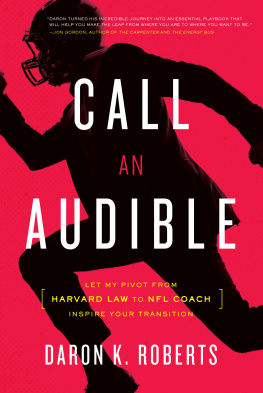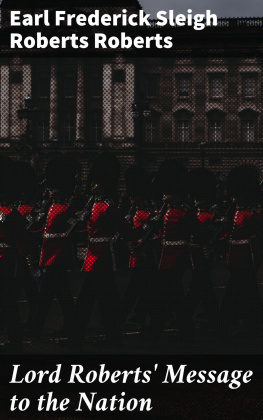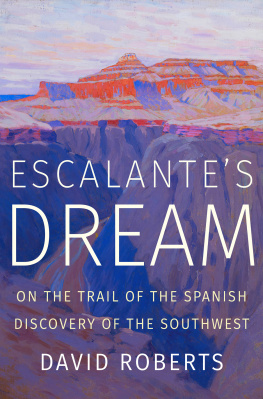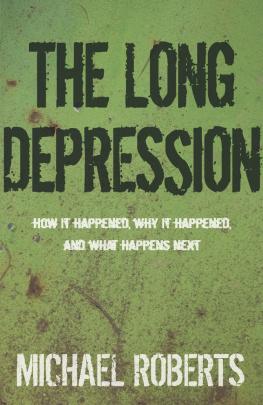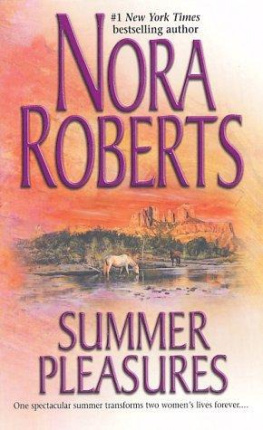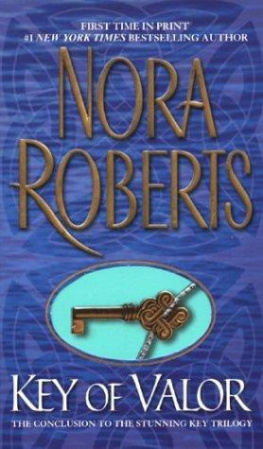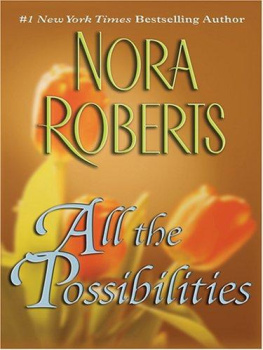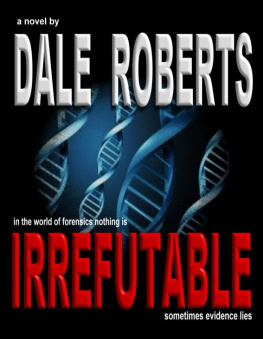ABOUT THE AUTHOR
Daron K. Roberts is a fifth-generation East Texan and the son of a Baptist minister and an elementary school principal. When Daron was seven, his father took out a map of Panola County drawn in the late 1800s. Panola County sent one company of soldiers to fight for the Confederacy during the Civil War. The map showed that Bill Roberts, Darons great-great-grandfather, owned approximately 150 acres in 1870, just five years removed from the end of the war. Darons father rolled up the map and simply said, This is why you will never have any excuses.
Darons path from East Texas followed the trajectory of his dads proclamation. He was elected class president all four years in high school and served as student body president at the University of Texas in 2000the largest student body in the nation at the time. After graduating from the Plan II Honors program, Daron ventured to the nations capital to work as an aide to Senator Joe Lieberman. He earned a master in public policy degree from the Harvard Kennedy School of Government in 2004the same year he was finally accepted into Harvard Law School after being wait-listed for three years.
During the summer before his last year in law school, Roberts decided to double down on his newfound desire to become a football coach. When the Kansas City Chiefs took him up on his offer to work for free, Roberts began making his dream a reality. Seven years and multiple NFL teams later, Roberts returned to the University of Texas to teach sports leadership courses and created the Center for Sports Leadership and Innovation. Through the Center, Roberts crafted a cutting-edge curriculumGameplan for Winning at Lifethat combines the leading research on connection, resilience, influence, and financial literacy. He teaches the course to all freshman athletes at the University of Texas. In addition to making nearly fifty speeches to audiences across the globe each year, Roberts is also the host of A Tribe Called Yes, a podcast that unearths the narratives of the worlds most famous risk-takers.
Daron and his incredibly beautiful and patient wife, Hilary, have four children: Dylan, Sydney, Jackson, and Delaney. They are undecided on whether or not they will uphold a premarriage commitment to have five kids.
Roberts has touched all seven continents, and yes, that includes Antarctica.
ACKNOWLEDGMENTS
I am grateful to Kirt and Gwen Roberts for raising me in a family that encouraged risk over comfort. I thank Kent Lance for helping me to embrace the joy of chasing the unknown. To my editor, Brandy Savarese, thank you for tolerating my early-morning and late-night rantsyou helped me to crystallize my thoughts and sharpen my words. And finally, to my sister, the first woman to show me what good writing looks and smells like, I extend my gratitude.
AFTERWORD
My son sauntered into the kitchen at 6 a.m. as only a three-year-old couldclumsily. It was February of 2014 and I was fresh from getting fired by the Cleveland Browns.
Hello, Dylan, I said. I couldnt see him, and he didnt respond, but I could sense him getting closer. Soon, he was standing right beside me.
You eat breakfast? he asked.
What? I shot back in an annoyed tone.
You, he said while punching the air with his pointer finger. Youuuu eeeaat breakfast? To ensure that I understood what he was saying, he pointed back and forth from me to the pan of scrambled eggs.
Thats when I got it. He had never seen me eat breakfast. Actually, Im sure he had, but it had occurred so infrequently that his mind had not recorded it as a normal event.
I dropped my spatula, sat down on the floor, and cried.
In the course of those two minutes, I realized that I had spent the majority of the previous seven years coaching the sons of other people. My 4 a.m. departures and midnight returns had prevented me from spending quality time with the most important son in my lifeDylan.
I loved coaching, but I couldnt reconcile not having the time to coach my own son. So I decided to take a year off and teach a course at UT. Making that decision was more difficult than getting into coaching, but I needed to regroup. I called my own audible.
Within four weeks of submitting a syllabus to the University of Texas, we packed and headed south to Austin. We found a great month-to-month lease and unpacked for a new life in the city. In the fall I would begin my appointment as a lecturer in the Liberal Arts Honors Program, teaching a sports leadership seminar.
And then, just as the fall semester was getting under way, TMZ released the surveillance video of the infamous Ray Rice episode. The footage showed Rice, a Baltimore Ravens running back, leveling his girlfriend, Janay Palmer, with a punch to the face. The incident ignited a national conversation about domestic violence.
Within weeks, Roger Goodell, the NFL commissioner, visited UTs football coach, Charlie Strong. Given Strongs hard-line stance and reputation as a disciplinarian, the visit made sense. My invitation was a surprise, even though I had known Commissioner Goodell since my time in Detroit.
The conversation between two of the most powerful men in sports orbited the very issue I was preaching in my classroom: the need for leadership and character development for athletes and coaches. That conversation sparked an idea in me: Why not create an institute that would leverage UTs academic and sports capital? We could create a leadership model for college athletes and deploy that system to high school players.
I had already written the blueprint while coaching for the Detroit Lions. I created a nonprofit football camp, 4th and 1, that combined football coaching with ACT prep and life skills development for high schoolers. Between camps in Michigan, Florida, and Texas, we had reached more than 500 young men. A typical day involved a two-mile run, a yoga class, football practice, a three-hour ACT prep, a session on meal etiquette, and a social media branding workshop. Why not bring that model to the next level at UT?
I took the idea to UTs president, Bill Powers, in October 2014. A scheduled thirty-minute discussion turned into an hour, and then another hour. On December 15, we stood shoulder-to-shoulder to announce the creation of the Center for Sports Leadership & Innovation (CSLI).
As the founding director, I created a three-hour course for UTs freshmen athletes. The syllabus revolved around leadership and financial literacy and the readings ranged from Machiavellis The Prince to Bren Browns Daring Greatly. In just under twelve months, we trained more than four hundred athletes and coaches in areas ranging from leadership to financial management. Now in our second year, we are on track to spread the movement around the entire country.
But, most important, every Saturday that I am home (which is most of the year), I attend the Donut Council with my three oldest kids. Every Friday night, we scout out donut shops on Google, select an unlucky target, and descend upon the establishment when the doors open the next morning. Dressed in our bright red T-shirts, we order mounds of donuts, talk about current events, and have a great time. The Donut Council is the highlight of my week, and an extension of my leadership philosophy: Lead by example and mentor through engagement.
I am spending life with the people I care about most. And that has made all the difference.
______________________
.
TABLE OF CONTENTS
This publication is designed to provide accurate and authoritative information in regard to the subject matter covered. It is sold with the understanding that the publisher and author are not engaged in rendering legal, accounting, or other professional services. If legal advice or other expert assistance is required, the services of a competent professional should be sought.
Next page
